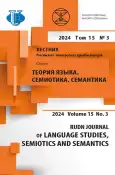Environmental Discourse in the “Telegram” Social Network: Methods and Means of Speech Influence
- 作者: Gaputina V.A.1, Mamontov A.S.1
-
隶属关系:
- State Institute of Russian Language named after A.S. Pushkin
- 期: 卷 15, 编号 3 (2024)
- 页面: 631-645
- 栏目: DISCURSIVE LINGUISTICS
- URL: https://journal-vniispk.ru/2313-2299/article/view/323577
- DOI: https://doi.org/10.22363/2313-2299-2024-15-3-631-645
- EDN: https://elibrary.ru/HSNCSN
- ID: 323577
如何引用文章
全文:
详细
Texts covering environmental problems act as translators of socially significant information that constructs a system of value coordinates and require comprehensive scientific understanding. The parameters of environmental discourse are considered in the «Telegram» social network. The relevance of the study is due to the need for a comprehensive study of the corpus of the latest texts, the unifying thematic component of which is nature and environmental protection. The purpose of the paper is to study the environmental discourse represented in the accounts of eco-bloggers in the Russian-language segment of the «Telegram» social network, in terms of the implementation in it of techniques of speech influence on the recipient. The functional and content complexity of the texts updated in the discursive space under study predetermined the variety of research methods used: from direct observation, continuous and random sampling, content analysis to linguopragmatic and structural-linguistic analysis of eco-blog texts. The study of eco-blogs made it possible to identify their specifics, as well as the range of methods and means of speech influence at the levels of composition and content, used by eco-bloggers in order to have a maximum impact on the worldview and behavior of the addressee and encourage him to take active actions in favor of preserving the cleanliness of the environment peace.
作者简介
Violetta Gaputina
State Institute of Russian Language named after A.S. Pushkin
编辑信件的主要联系方式.
Email: wwwgaputina@gmail.com
ORCID iD: 0000-0002-7885-9611
SPIN 代码: 7813-8287
PhD in Philology, Associate Professor, Associate Professor of Department of Russian Literature and Intercultural Communication, Faculty of Philology
6, Academician Volgina Str., Moscow, Russian Federation, 117485Alexander Mamontov
State Institute of Russian Language named after A.S. Pushkin
Email: as-mamontov2@yandex.ru
ORCID iD: 0000-0002-6703-637X
SPIN 代码: 2815-4443
Dr. Sc. (Philology), Professor, Professor of Department of Russian Literature and Intercultural Communication, Faculty of Philology
6, Academician Volgina Str., Moscow, Russian Federation, 117485参考
- Shchurina, Yu.V. (2016). Genre originality of the social network Instagram*[5]. Speech Genres, 1(13), 156–158. https://doi.org/10.18500/2311-0740-2016-1-13-156-168 (In Russ.).
- Karasik, V.I. (2019). Genres of network discourse. Speech Genres, 1(21), 49–55. https://doi.org/https://doi.org/10.18500/2311-0740-2019-1-21-49-55 (In Russ.).
- Navoloka, Yu.S. (2018). Hashtag text as a new text format in the Internet space (using the example of the social network Instagram*). Philology. Theory & Practice, 12–3(90), 568–573. (In Russ.).
- Patrusheva, L.S. (2018). Hashtagging as a new communication process. Bulletin of Udmurt University. Series History and Philology, 28(3), 471–475. (In Russ.).
- Krylova, M.N. (2019). The language of modern Internet communication (based on the intellectual content of the social network “VKontakte”). Current Issues in Philology and Pedagogical Linguistics, 1, 128–137. https://doi.org/10.29025/2079–6021-2019-1-128-137 (In Russ.).
- Kalugina, Yu.V., Mustafina, A.R. & Edeleva, I.V. (2020). Functional potential and linguistic features of modern hypertext (based on Live Journal, Twitter and Instagram*). Prepodavatel XXI vek, 2, 393–403. https://doi.org/10.31862/2073-9613-2020-2-393-403 (In Russ.).
- Grishanina, A.N. (2017). Personality in the coordinates of social networks: constructivism and destructivism of speech behavior. Humanitarian Vector, 12(2), 109–115. https://doi. org/10/21209/1996-7853-2017-12-2109-115 (In Russ.).
- Kuryanovich, A.V. (2017). Deviant speech behavior of users of network correspondence: factors of discursive conditioning and forms of manifestation. Tomsk State Pedagogical University Bulletin, 7(184), 78–84. https://doi.org/10.23951/1609-624X-2017-7-78-86 (In Russ.).
- Zyryanov, B.V. (2018). Strategies for promoting a personal account on Instagram*. Theoretical and Practical Issues of Journalism, 7(3), 539–556. https://doi.org/10.17150/23086203.2018.7(3).539-556 (In Russ.).
- Terskikh, M.V. (2020). Tools for advertising promotion on the Instagram* network: genre and language features. Nauchnyi dialog, 6, 178–189. https://doi.org/10.24224/2227-1295-2020-6178-189 (In Russ.).
- Blinova, O.A. (2019). Multimodality in network political discourse: Internet memes about Scottish independence. Nauchnyi dialog, 10, 79–93. https://doi.org/10.24224/2227-12952019-10-79-93 (In Russ.).
- Madzhaeva, S.I. & Gagarina, E.Yu. (2019). Medical Internet forum and social network: definition and functions. Bulletin of Chelyabinsk State University, 6(428), 101–106. https:// doi.org/10.24411/1994-2796-2019-10613 (In Russ.).
- Dugalich, N.M. & Ebzeeva, Yu.N. (2024). French medical memes: Themes, language, functions. Training, Language and Culture, 8(2), 20–30. https://doi.org/10.22363/2521-442X-2024-8-2-20-30.
- Terskikh, M.V. (2019). Genre specificity of sports brand accounts in the aspect of socially oriented business (using the example of the social network Facebook*). Nauchnyi dialog, 3, 132–146. https://doi.org/10.24224/2227-1295-2019-3-132-146 (In Russ.).
- Sobyanina, V.A. (2019). About some lexical features of German cosmetology discourse on the Internet. MCU journal of philology. theory of linguistics. linguistic education, 3(35), 33–41. https://doi.org/10.25688/2076-913X.2019.35.3.04 (In Russ.).
- Bozhenkova, N.A. & Negushina, A.A. (2021). Interpersonal characteristics of Russianlanguage feminist media discourse (using the example of the Telegram channel “The Rober’s Daughter”). Kul’tura i tekst, 4(47), 240–252. (In Russ.).
- Gaputina, V.A. (2018). Fashion discourse in the social network Instagram*. Mir Nauki, Kul’tury, Obrazovaniya, 2(69), 526–530. (In Russ.).
- Kalenova, O.G. & Dubrovskaya, T.V. (2015). On the problem of determining environmental discourse and its genres. Actual issues of modern philology and journalism, 2(16), 6–12. (In Russ.).
- Zaitseva, A.V. (2022). Diversity of virtual genres of environmental discourse in Germany (using the example of Internet communication on environmental topics). Philology. Theory & Practice, 15(8), 2573–2579. (In Russ.).
- Pavlova, E.B. (2019). Linguistic and pragmatic organization of English-language environmental Internet discourse. Nauchnyi dialog, 1, 88–100. https://doi.org/10.24224/2227-1295-2019-188–100 (In Russ.).
- Shelestyuk, E.V. (2014). Speech influence: ontology and research methodology: monograph. Moscow: FLINTA: Nauka. (In Russ.).
- Glinchevsky, E.I. (2005). Means of speech influence in the language of the media. Moscow university bulletin. series 19: linquistics and intercultural communication, 4, 18–27. (In Russ.).
- [*] The * sign marks social networks that are part of the Meta Corporation, whose activities have been recognized as extremist and banned in the territory of the Russian Federation since March 2022.
补充文件









